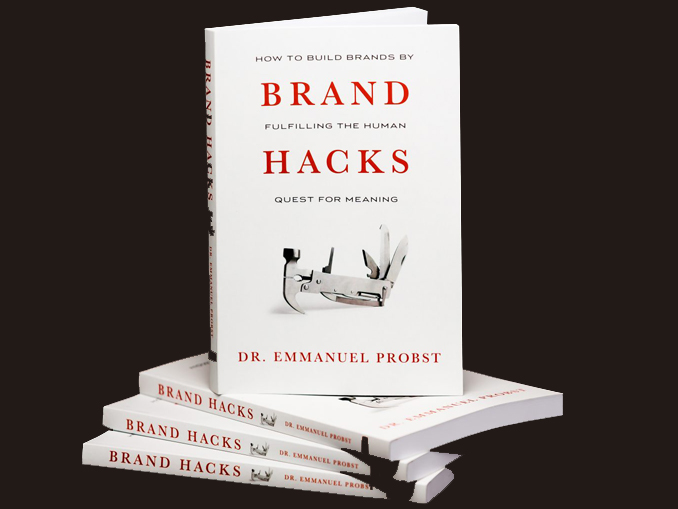Reviewed by Susan Fader, Fader & Associates, Teaneck, NJ, susanfader@faderfocus.com
Brand Hacks: How to Build Brands by Fulfilling the Human Quest for Meaning by Dr. Emmanuel Probst, Paramount Market Publishing, 2019
There are many business books out there that repackage psychological studies and primarily focus on often-told large company or Navy Seal case studies. So while they may be entertaining, many are mostly just a rehash of what you may already know, without delivering much in the areas of new ideas, perspectives, or ways of thinking.
Emmanuel Probst’s Brand Hacks: How to Build Brands by Fulfilling the Human Quest for Meaning is a book that provides something new and relevant. It is a how-to guide on effective brand building, brand management, and consumer engagement, and the initiatives that brands can take. Probst describes Brand Hacks as being different than other marketing books because it looks at the world through the lens of consumers, not marketers. He believes most marketing and advertising executives live in a bubble, disconnected from the real-world consumers they target. What makes this book so relevant is that Probst recognizes that today’s consumers live in an always-connected digital world where brands must evolve to connect with these consumers.
Probst infuses the book with examples of how brands can deepen their meaning with customers. He emphasizes that brands need to recognize that experiences, such as travel, learning a new hobby, and eating new foods are the new status symbols—not buying and owning. He explores the role of influencer marketing and its negative impact on multiple brands. He advocates for the end of demographic-based segmentation, because he believes for many categories a consumer’s income is irrelevant, e.g., leisure and entertainment where “it would be naïve to think…fans are ‘high-income earners’.” He feels that more attention should be paid to psychographics and micro-moments, the short moments when people want help informing their choices or decisions, thus providing brands with opportunities to shape consumers’ decisions. It was refreshing that he used a number of case studies I had not heard before, and shared examples of different types of products and services, and sizes of companies (e.g., DTC, start-ups, and old-established) to drive home his messages.
In writing this book, Probst draws on his strong and deep academic and business experience—PhD in consumer psychology, adjunct professor of consumer market research at UCLA, customer journey consultant to numerous Fortune 500 companies, and in his new role as SVP of brand health tracking at Ipsos. This background contributes to Brand Hacks being an actionable book that bridges the academic and practitioner worlds. The structure of the book allows the reader to digest the information in multiple ways. There is a bonus if the reader wants to dig deeper into a specific area. At the end of each chapter, in the Note section, there are many linked articles, TED talks, and book references. However, the book and its ideas stand on their own without the need to reference anything in the Note sections.
Probst believes that big data, predictive analytics, and sophisticated algorithms tell you nothing about how people feel and what is deeply meaningful to them. He believes that people (consumers) are on a quest in three areas of their lives—for personal, social, and cultural meaning—and that for brands to be successful they need to connect with the individual in these three quest areas.
In the book, each of these three quest themes have multiple chapters that focus on different aspects of that particular quest. Each chapter includes four components: an overview background of the topic being discussed; core case studies of what brands do right; brand hacks (concrete examples of how brands can achieve specific goals); and a key takeaway summary. The reader can choose to read the book in sequence, jump around, or focus on one aspect, e.g., the brand hack sections. All ways would be satisfying and enlightening.
Brand Hacks has given me a new, and what I feel is an updated perspective, on how we should be positioning, marketing, communicating, and interacting with a brand’s targeted consumers. With the many brand hack examples of how to do this, Brand Hacks will also serve as a reference book to reach for when you are working on marketing-related issues. Brand Hacks is a must-read for anyone who is involved in any aspect of interaction with consumers.


Be the first to comment